March 2020: Olive Tree

Volume IV/Issue 12/March 2020


From The Editorial Desk
Saint Joseph--Father Of Jesus

One summer evening during a violent thunderstorm, a mother was tucking her small son into bed. She was just about to turn off the light when he asked in a trembling voice, "Mommy, will you sleep with me tonight?" His mother smiled and gave him a reassuring hug. "I can’t, Dear," she said, "I have to sleep with your daddy." After a long silence he said, "The big sissy."
There are certain sayings we associate with our fathers. Here are some typical Dad quotes:
“Ask your mother.”
”Don’t worry; it’s only blood.”
”Do I look like I’m made of money?”
“I’m not sleeping; I was watching that show.”
”I’m not just talking to hear my voice.” ”A little dirt never hurt anyone; just wipe it off.”
”We’re not lost!”
”No, we’re not there yet.”
”Don’t make me stop this car!”
I looked in my Bible for a quote from another prominent father, Saint Joseph, and to my surprise I couldn’t find one. I never thought about this before, but Joseph doesn’t say a single word in the Gospels. Instead we see him listening and the obeying.
Every failure in life can be attributed to not listening to God. The Bible teaches us that listening means we hear what God has to say and we do it. The reason it is a challenge to listen to God is because we often filter what we hear by what we want. When you listen to God (hearing and obeying what He says) it will often be quite challenging to do so because His ways are not our ways, and we will have to deal with our flesh to submit to Him. Remember His ways are always better.
Christians often think they are listening to God, but if we are, then many times our flesh will feel uncomfortable, and we as humans don’t like that. But every time I have ever failed in any area of my life as a Christian, it was because I was not fully listening to God. I was either not taking the time necessary to do so, or I was not willing to deal with my flesh to do what God had said. What often seems right to us is of course not right with God.
Every time I have listened and obeyed God, which almost always included me having to crucify my fleshly man to accept God’s way of doing things, I have seen victories in my life. God has never had anyone in the Bible who truly listened and obeyed Him walk in defeat. It has never happened. So the question becomes are we really listening and obeying God? If we are, there will most certainly be an uncomfortable part of our flesh to deal with, but the result will always be success. So let take Saint Joseph's example in the Gospels to heart. Less talking....more listening....complete obedience.
Living In The Flesh

"For what things a man shall sow, those also shall he reap. For he that soweth in his flesh of the flesh also shall reap corruption. But he that soweth in the spirit of the spirit shall reap life everlasting." (Galatians 6:8)
The first four are definitely in the flesh, as they relate to fleshly desires against the sixth commandment. Fornication, uncleanness, immodesty and luxury. This latter we know more as lust. It is not luxury as living in luxury, although such living can lead to these vices.
The next group begins with idolatry and continues with witchcrafts. We can make idols of many things. When we think of idols, we think of statues of some pagan god. Pachamama comes to mind, an Amazonian pagan god. However, we can make idols of many things, such as our material possessions. The television and other electronic devices can become idols to us, especially is we devote a great deal of time to them. Notice the word devote. We talk of devotion and devotions. How much time do we devote to Almighty God? How much time do we devote to our electronic devices? Think carefully, because this tells whether the phone is more important to you than God is.
Henry Edward Cardinal Manning towards the end of the nineteenth century wrote: "At first sight some may wonder why St. Paul after summing up a black list of the sins of the flesh adds “enmities, contentions, emulations, wraths, quarrels, dissensions, sects,” and closes with “murders, drunkenness, revellings, and suchlike.” (Galatians 5:19-21) In truth, the spiritual sins of “enmities and dissensions” are more Satanic than the sins of the flesh, for Satan has no body; and they are more at variance with God, because they are spiritual, and God is charity."
With this in mind, let us begin with the last group, murders, drunkenness, revellings and such like." We can be murderers of some one's character as well as of their body. Consider that every time we misuse our tongue and speak evil of someone, we are murdering their character. Drunkenness is easy to understand. However, today we can be drunk with substances other than alcohol. Drugs bring about the same or similar problems as alcohol does. "And be not drunk with wine, wherein is luxury; but be ye filled with the holy Spirit," (Ephesians 5:18) Drunkenness leads often to sins of the flesh, which we have already considered. The word translated as revellings can also be translated as carousing, merry-making and feasting. How many of us want to have a party in our mouth and eat what we should not eat, rather than what we should to maintain our health. Let your food be your medicine. Indeed it is a sin to eat too much or wrong food that it causes illness.
Let us finish with the sins, Cardinal Manning calls spiritual sins: "enmities, contentions, emulations, wraths, quarrels, dissensions, sects, envies," Manning notes that these vices are contrary to charity.
Enmities can also mean unfriendliness and hostility. How many of us find ourselves entangled in contentions? Emulations can also mean rivalry and ambition. Indeed doesn't ambition cause many sins? Wrath also means anger. Saint Paul advises us: "Be angry, and sin not. Let not the sun go down upon your anger." (Ephesians 4:26) When we let anger fester in our hearts, it slowly hardens the heart until God cannot penetrate our own heart any more. Anger could be said to be a road that leads to hell. Quarrels should be easy to understand. Often we get into a quarrel, because we want to prove we are right, when it will do no good. This is a good time to walk away, because an argument with a fool is an argument between fools. Saint Paul tells the Corinthians (I Cor 4:10: "We are fools for Christ's sake," We are fools for Christ's sake, because what we do appears foolish to the world. We should not involve our self with dissension. From dissension often comes schism, which creates sects. The Church is called Catholic, because it is for all people of all times. A sect is usually a small group, which has separated itself from their duty to evangelize the world. We conclude with envy, which is a desire for the spiritual goods of another. We also find envy in the material world, where someone desires the goods of others. From envy naturally flows dissension and anger.
"And they who are in the flesh, cannot please God." (Romans 8:8)
If we live in the flesh indulging our desires, we cannot please Almighty God. Consider this well.
Matthew 5:23-25: "If therefore thou offer thy gift at the altar, and there thou remember that thy brother hath any thing against thee; Leave there thy offering before the altar, and go first to be reconciled to thy brother: and then coming thou shalt offer thy gift. Be at agreement with thy adversary betimes, whilst thou art in the way with him: lest perhaps the adversary deliver thee to the judge, and the judge deliver thee to the officer, and thou be cast into prison."
Jesus teaches: "But I say to you that hear: Love your enemies, do good to them that hate you." (Luke 6:27) Are we ready to do good to our adversary, if the need arises? This must be our intention, if the opportunity presents itself.
What Are You Hungry For?

I was reading an article today where the heart of the article focused on the following premise: what people are searching for and what they are getting (or not getting, as the case may be) when searching for churches. The one quotation that caught my attention was "I'm just not getting fed." It's funny to think about the fact that if you have not had anything to eat for a while, your mind starts to dwell on that fact and nothing else. We focus on everything that we might want to eat: pizza . . . Chinese food . . . spaghetti . . . Mexican . . . . fast food . . . fried chicken . . . a sandwich . . . And we finally make the decision as to what exactly we want and once we do . . . that's it. We fixate on the food of choice until we get it. And then finally we eat and we are satisfied.
As Christians, we also have to be fed on a daily basis. The article that I was mentioning at the beginning of this short essay of sorts was focused on pastors needing to feed their flock with the Word of God. And this is certainly the truth. People are hungry for the Word of God. They want to hear what God is saying to them. But pastors, priests, ministers, bishops, etc. can only do so much in a given week. What I mean is that time is limited in what the priest or pastor can talk about in a given week. If the average church service is, say, an hour . . . an hour and a half . . . how much of that time is strictly the preaching of the priest or minister? Fifteen minutes? Twenty minutes? More? Less? As my congregation will let you know, I don't time my preaching . . . . . I just start in and see where God is leading me! But even with that, I might get twenty minutes of preaching in on a given Saturday evening or Sunday morning. Think about it. Twenty-four hours in a day. Seven days in a week. By my calculation, that is One-Hundred and Sixty-Eight hours in a given week and the preacher gets fifteen, twenty, maybe thirty minutes of preaching out of all those hours. That's not much time in comparison. So that's why I say, in essence what the preacher is doing is planting the seed and leaving the rest to God.
One of my favorite Scripture passages is from First Kings. It is the passage where the Prophet Elijah is fleeing from Jezebel and Elijah "went a day's journey into the wilderness, and came and sat down under a juniper tree: and he requested for himself that he might die: and said, it is enough; now, O Lord, take away my life: for I am not better than my fathers." (I Kings 19:4)
Then Elijah laid down and went to sleep and the angel of the Lord touched Elijah and "said unto him, Arise and eat." (Verse 5) And Elijah had seen where the angel of the Lord had placed there by his head water and food for him to eat.
And then Elijah laid down again, . . . "And the angel of the Lord came again the second time, and touched him, and said, Arise and eat: because the journey is too great for thee." (Verse 7)
This is certainly one of my all-time Scripture passages. I think it is profound for a number of reasons:
First, God does indeed feed us. He feeds us through the Word of God. We Christians must be hungry for the Word of God. In our society, there are so many different types of food to choose from: pizza . . . Chinese food . . . Mexican food . . . fast-food . . . chicken . . . seafood . . . . etc. Likewise, many people choose to get fed from different interests, desires, etc: power, riches, money, fame, drugs, alcohol, etc. People make choices where they eat and how they spend their time. We, as Christians, have to make a choice as well: we have to want to be fed by the Word of God. And then make a point of studying the Word of God on a daily basis. Get in the habit of reading the Bible every day.
Secondly, God also feeds us through His Church. God does not need our help but He desires us to help Him. And as a result, He founded the Church here on earth. And the Church distributes the Sacraments to the world. And the Chief Sacrament is the Mass. Come to Mass and receive the Precious Body and Blood of Our Blessed Saviour. Our Lord loves us so much that He gives of Himself so that we can be nourished. "Arise and eat: because the journey is too great for thee!" Our Lord wants us to receive of the Sacraments of the Church as a physical and spiritual reminder that He is alive and well in the world. The Sacraments help nourish and sustain us in the long journey we call "life."
Thirdly, this passage gives hope to each and everyone of us that we too can do what God is calling us to do. Elijah himself was one of the greatest of the Old Testament prophets. But even though he was one of the greatest prophets, he still ended up being scared when he was threatened by Jezebel. He still needed to be guided by God. He still needed to be fortified by God. Sometimes we think we have everything altogether by ourself and we do not need anyone else. And then when things do go wrong, so often we throw in the towel. We give up. We say it's useless. As we saw, Elijah felt that way. He was ready to give up. He was ready to throw in the towel. But God nourished Elijah. God fed him so that he could keep going. We need that nourishment as well. We need to be reminded that we can not do these things on our own. We need God on our side. With God, all things are possible. During this Lent, let us remind ourselves of that fact and keep moving forward.
The Funny Pharmacy
A joyful mind maketh age flourishing: a sorrowful spirit drieth up the bones. - Proverbs 17:22
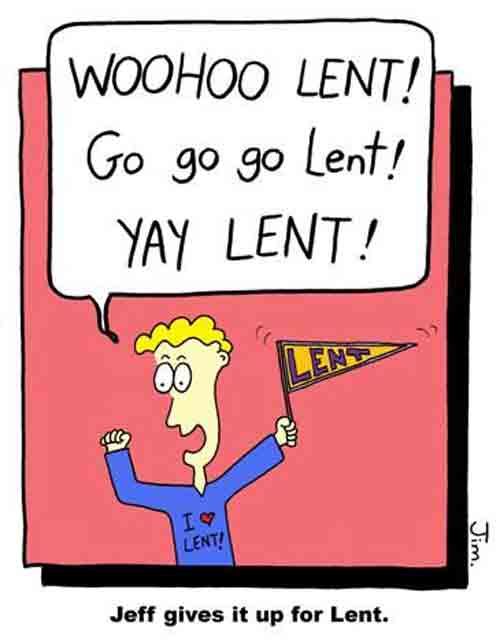
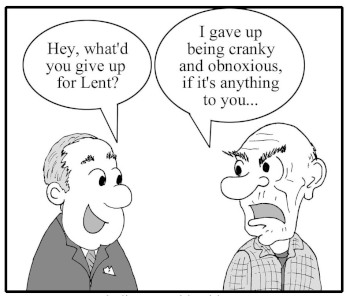
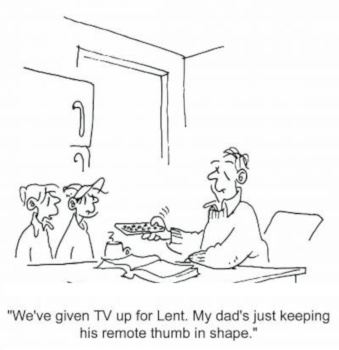




Were the specific pronouncements made by Vatican II were also heretical in total? Or, only selective pronouncements or documents? If only selected ones, why?
No, parts of Vatican II may not be heretical.
To answer the second question, Pope Pius VI issued the decree Auctorem Fidei to condemn the errors of the Jansenist Synod of Pistoia. He extracted the errors and then condemned them. Some of the propositions may not have been heretical or even erroneous, as heretics do not reject all doctrines, only some of them.

The Pope Speaks: March 2020
Traditionalism And Fasting

The fast laws of the Church have varied over the centuries from the beginning of the Church. For instance, our Friday abstinence comes from the fact that early Christians fasted on Fridays in honor of the Crucifixion. In Traditionalism we have identified several time periods. Early Traditionalism from the time of Vatican II to the very early 1970's, when people realized that not only was the Faith being changed, but also the liturgy. The second period began when we began leaving the Vatican II Church in the very early 1970's until Traditionalists began to get church building and pews in the late 1970's.
As we have noted in other articles, the first generation Traditionalists ignored the changes going on in the Mass, We also ignored the relaxations going on in the fast laws of the Church. We all knew that fast laws change, as they had over the century before Vatican II. In 1966, when Paul VI virtually eliminated fasting and abstinence in the Church, we all went along.
Let us look at the fast laws of the Church a moment. In his Summa Theologica, Saint Thomas Aquinas asks whether the ninth hour is the appropriate time for the faster's meal. In the thirteenth century, when Aquinas wrote, Christians ate one meal a day on fast days at three (the ninth hour) in the afternoon. This meal was meatless. Eggs and meat products were also forbidden as was wine and beer, which were staples in people's meals at the time. In fact in Germany, beer is called liquid bread. Over time the meal was moved to noon time. The office of None was also moved earlier on fast days, which is where noon got its current name. When the main meal was moved earlier, a collation was added in the evening to maintain strength.
Saint Alphonsus, who lived in the eighteenth century wrote in his Golden Book of the Commandments and Sacraments: "In the fast of the Church three things are commanded: First, to abstain from forbidden meats; secondly, to eat but one meal in the day; thirdly, not to eat the meal before the hour prescribed." In this same book, though, he notes: "The second obligation of the fast is to eat but one meal in the day, and a small collation in the evening. In ancient times, Christians ate barely once a day, in the evening; and except at that meal, they tasted nothing during the day. The Church afterwards permitted a collation."
In the late nineteenth century, the Baltimore Catechism states: "It is permitted on fast days, besides the one full meal, to take two other meatless meals, to maintain strength, according to each one's needs. But together these two meatless meals should not equal another full meal." Notice the words, to maintain strength. In the mid nineteenth century, Father Leonard Goffine observed that to desire no aggravation in fasting is not to fast at all.
Canon 1251 of the Code of Canon Law (1917) provides: "The law of fasting prescribes that only one full meal a day be taken, but does not forbid a small amount of food in the morning and in the evening. As to the kind of food and the amount that may be taken, the approved customs of the place are to be observed." Notice the attitude. The two small meals are not forbidden, which implies one meal a day is encouraged. The fast was further relaxed in the United States from the Code of Canon Law.
The Eucharistic Fast was originally from midnight, requiring nothing in the way of food or drink, including water, be taken prior to Holy Communion. Our grandmother noted her own First Communion about the turn of the nineteenth to twentieth century. She was taken by her father from their farm into Brookville, ten miles away, by wagon to stay with her aunt. Her aunt took the ladle out of the water barrel, so she would not get a drink of water in the middle of the night.
In 1953 at the request of the Diocesan Bishops, Pope Pius XII allowed a three hour fast prior to an evening Mass. The Eucharistic Fast was further relaxed in 1957 by the same Pope. Paul VI allowed a one hour fast prior to Holy Communion, which early day Traditionalists accepted in light of Pope Pius XII's changes.
When we began leaving the Novus Ordo Church, we realized all of these relaxations that had crept in. We got out whatever books we had access to, so we could return to Catholic practices in the area of fasting. We followed the principle Father James Dunphy had laid down in regard to acquiring books, which we had begun doing. He told us to reject any book after 1959. We have heard that Mother Angelica draws the line at 1962, although We cannot confirm this.
In the Eucharistic Fast, we fasted from midnight for a morning Mass and three hours for an evening Mass. We did permit water and other liquids as Pope Pius XII had permitted them. In the fasting for Lent, Vigils and Ember Days, we returned to the fast laws as they existed in 1958.
https://www.vaticaninexile.com/files/fasting%20brochure.pdf


Saint John Cassian
On The Eight Vices

On Dejection
Our fifth struggle is against the demon of dejection, who obscures the soul's capacity for spiritual contemplation and keeps it from all good works. When this malicious demon seizes our soul and darkens it completely, he prevents us from praying gladly, from reading Holy Scripture with profit and perseverance, and from being gentle and compassionate towards our brethren. He instills a hatred of every kind of work and even of the monastic profession itself. Undermining all the soul's salutary resolutions, weakening its persistence and constancy, he leaves it senseless and paralyzed, tied and bound by its despairing thoughts.
If our purpose is to fight the spiritual fight and to defeat, with God's help, the demons of malice, we should take every care to guard our heart from the demon of dejection, just as a moth devours clothing and a worm devours wood, so dejection devours a man's soul. It persuades him to shun every helpful encounter and stops him accepting advice from his true friends or giving them a courteous and peaceful reply. Seizing the entire soul, it fills it with bitterness and listlessness. Then it suggests to the soul that we should go away from other people, since they are the cause of its agitation. It does not allow the soul to understand that its sickness does not come from without, but lies hidden within, only manifesting itself when temptations attack the soul because of our ascetic efforts.
A man can be harmed by another only through the causes of the passions which lie within himself. It is for this reason that God, the Creator of all and the Doctor of men's souls, who alone has accurate knowledge of the soul's wounds, does not tell us to forsake the company of men; He tells us to root out the causes of evil within us and to recognize that the soul's health is achieved not by a man's separating himself from his fellows, but by his living the ascetic life in the company of holy men. When we abandon our brothers for some apparently good reason, we do not eradicate the motives for dejection but merely exchange them, since the sickness which lies hidden within us will show itself again in other circumstances.
Thus it is clear that our whole fight is against the passions within. Once these have been extirpated from our heart by the grace and help of God, we will readily be able to live not simply with other men, but even with wild beasts. Job confirms this when he says: "And the beasts of the field shall be at peace with you." (Job 5:23)
But first we must struggle with the demon of dejection who casts the soul into despair. We must drive him from our heart. It was this demon that did not allow Cain to repent after he had killed his brother, or Judas after he had betrayed his Master.
The only form of dejection we should cultivate is the sorrow which goes with repentance for sin and is accompanied by hope in God. It was of this form of dejection that the Apostle said: "Godly sorrow produces a saving repentance which is not to be repented of." (II Cor. 7:10) This "godly sorrow" nourishes the soul through the hope engendered by repentance, and it is mingled with joy. That is why it makes us obedient and eager for every good work: accessible, humble, gentle, forbearing and patient in enduring all the suffering or tribulation God may send us. Possession of these qualities shows that a man enjoys the fruits of the Holy Spirit: love, joy, peace, long-suffering, goodness, faith, self-control (cf. Gal. 5:11). But from the other kind of dejection we come to know the fruits of the evil spirit: listlessness, impatience, anger, hatred, contentiousness, despair, sluggishness in praying. So we should shun this second form of dejection as we would unchastity, avarice, anger and the rest of the passions. It can be healed by prayer, hope in God, meditation on Holy Scripture, and by living with godly people.

Saints from East and West

February 9 - Saint Nicephorus
Sapricius and Nicephorus were two Christians who dwelt in the same town during the persecution of the Emperor Valerian. For many years they entertained for each other the affection of brothers, till at last an unhappy quarrel took place between them, and their former love was succeeded by the most bitter hatred. After some time Nicephorus, entering into himself, conceived a great desire to be reconciled to Sapricius. He accordingly applied to some friends of the latter to procure a meeting between them, but in vain. He then went in person to the house of Sapricius, and, throwing himself at his feet, besought him to consent to a reconciliation; but Sapricius refused to listen to the proposal. Meanwhile, a violent persecution broke out against the Church, and Sapricius, who was known to be a Christian, was seized and brought before the judge. Although cruelly tortured in many ways, he persisted in his profession of faith, and declared that he would rather die than sacrifice to the idols. Upon his confession he was condemned to lose his head. Nicephorus, hearing of what had passed, and that Sapricius was actually on the way to execution, ran from his house, and met him at the end of the street. There casting himself upon the ground, he besought him earnestly to pardon him; but Sapiricius turned away his head. Nicephorus, almost broken-hearted, ran to the place of execution by another road, and there throwing himself on his knees before Sapricius, creid out, “Martyr of the true God, pardon me, I conjure you!” but the wrtched Sapiricius refused to listen. At the same moment Sapricius, by a just judgment of God, was seized with a terrible fear of death, and when told to lay his head upon the block, cried out trembling, “Why would you put me to death? I am ready to offer sacrifice.” Nicephorus, grieved to the heart at the apostasy of the wretched Sapricius, and feeling himself animated with a courage which God bestowed upon him in reward of his charity, cried aloud that he was a Christian, and ready to die for his faith. The Roman judge instantly condemned him to be beheaded, and thus in a moment he received the glorious crown of martyrdom, which Sapricius had deservedly lost.

March 27 - Saint Matrona of Thessalonica.
The Holy Martyress Matrona of Soluneia (Thessalonica) suffered in the third or fourth century. She was a slave of the Jewess Pautila, wife of one of the military commanders of Soluneia. Pautila forced her slave into apostasy and conversion to Judaism, but Saint Matrona, having her faith in Christ since her youthful years, still firmly believed in Christ and went to church secretly, unbeknownst to her vengeful mistress.One time Pautila, having learned that Blessed Matrona had been in church, asked: "Why hast thou not come to our synagogue, but instead did walk to the Christian church?" Saint Matrona boldly answered: "Because in the Christian church God is present, but He is gone away from the Jewish synagogue." Pautila went into a rage and mercilessly beat Saint Matrona, and having tied her shut her into a dark closet. In the morning Pautila discovered that Saint Matrona had been freed of her bonds by an unknown Power. In a rage Pautila beat the martyress almost to death, then tied her again even more tightly and locked her in the closet, having sealed the door, so that no one might offer help to the sufferer. The holy martyress was there over the course of four days without food or water, and when Pautila opened the door, she again beheld Saint Matrona out of her bonds standing at prayer. In a fierce rage Pautila began to beat the holy martyress with a stout cane and, when the saint was barely breathing, the fierce woman locked her in the room, wherein also the Martyress Matrona gave up her spirit to God.
The body of the holy martyress was thrown from the city wall, by order of Pautila. Christians took up the much suffered body of the holy martyress and reverently gave it over to burial. And later on, the bishop of Soluneia, Alexander, built a church in the name of the holy martyress, in which they put her holy relics, glorified by miracles.
The judgement of God soon overtook the tormentor Pautila at that very place where the body of Saint Matrona had been throw from the high wall. She herself stumbled, fell off it, and was smashed, having received her just reward.


Books to feed your faith!
Lenten Instructions from the Roman Breviary
$9.95
The Roman Breviary is full of inspirational prayers and lessons. These lessons are compiled from the lessons of Matins. On Sundays and greater feasts Matins consists of three nocturns. Each nocturn consists of three psalms and three lessons. The first nocturn has lessons from Sacred Scripture. Since the Bible is readily available, this is omitted from this work. The second nocturn on the feast of saints gives their life story. It is these stories, which are most instructive. On Sundays, these lessons are an explanation either of the current Scripture or some other inspirational instruction and these are included here. The third nocturn is on the day's Gospel. The first lesson begins with a short quote from the Gospel of the day, followed by the beginning of the instruction. These are included here. On smaller feasts and ferial days, there is only one nocturn of nine psalms and three lessons. In Lent, these lessons are on the day's Gospel, while on other ferial days they are from Scripture. On minor feast days, the first two are from Scripture, the third on the day's feast. In Lent there are forty different Gospels read, and the lessons on these form the bulk of this work. The lessons in the Breviary come from the Fathers of the Church and are quite instructive. This work would serve as a good companion to Sunday Sermons of the Great Fathers, as it covers material not contained in this other excellent work. The Fathers of the Church bring out points we may not have considered in our meditations on the daily Gospels. We pray all find these instructions as fruitful as I have. We have included the instructions for the three Sundays prior to Ash Wednesday, Septuagesima, Sexagesima and Quinquagesima, as they form a remote preparation for the commemoration of the mysteries of our Redemption at the end of Holy Week.
The Liturgical Year: Lent (Volume 5)
$24.95
This is a fifteen volume set, which is being brought back into print for the edification of the Faithful. Anyone who wishes to appreciate the timeless Tridentine Mass and liturgy will find this set a valuable aid in that endeavor. Dom Gueranger has produced a most excellent work, which began the liturgical movement. We pray that this set of books will bring many more to a true appreciation of the Latin Mass and the Divine Office of the Catholic Church. At one time, under the impulse of that Spirit, which animated the admirable Psalmist and the Prophets, she takes the subject of her canticles from the Books of the Old Testament; at another, showing herself to be the daughter and sister of the holy Apostles, she intones the canticles written in the Books of the New Covenant; and finally, remembering that she, too, has had given to her the trumpet and harp, she at times gives way to the Spirit which animates her, and sings her own new canticle. From these three sources comes the divine element which we call the Liturgy. The Prayer of the Church is, therefore, the most pleasing to the ear and heart of God, and therefore the most efficacious of all prayers. Happy, then, is he who prays with the Church, and unites his own petitions with those of this Spouse, who is so dear to her Lord, that he gives her all she asks. It was for this reason that our Blessed Saviour taught us to say our Father, and not my Father; give us, forgive us, deliver us, and not give me, forgive me, deliver me. Hence, we find that, for upwards of a thousand years, the Church, who prays in her temples seven times in the day, and once again during the night, did not pray alone. The people kept her company, and fed themselves with delight on the manna which is hidden under the words and mysteries of the divine Liturgy. Thus initiated into the sacred Cycle of the mysteries of the Christian year, the faithful, attentive to the teachings of the Spirit, came to know the secrets of eternal life ; and, without any further preparation, a Christian was not unfrequently chosen by the Bishops to be a Priest, or even a Bishop, that he might go and pour out on the people the treasures of wisdom and love, which he had drunk in at the very fountain-head. For whilst Prayer said in union with the Church is the light of the understanding, it is the fire of divine love for the heart. The Christian soul neither needs nor wishes to avoid the company of the Church, when she would converse with God, and praise his greatness and his mercy. She knows that the company of the Spouse of Christ could not be a distraction to her. Is not the soul herself a part of this Church, which is the Spouse? Has not Jesus Christ said: Father, may they be one, as we also are one? and, when many are gathered in his name, does not this same Saviour assure us that he is in the midst of them? The soul, therefore, may converse freely with her God, who tells her that he is so near her; she may sing praise, as David did, in the sight of the Angels, whose eternal prayer blends with the prayer which the Church utters in time.
Charity: A Commentary on I Corinthians 13 by Saint Alphonsus
$9.99 paperback / $0.99 Kindle
Charity is patient, is kind: charity envieth not, dealeth not perversely; is not puffed up; Is not ambitious, seeketh not her own, is not provoked to anger, thinketh no evil; Rejoiceth not in iniquity, but rejoiceth with the truth; Beareth all things, believeth all things, hopeth all things, endureth all things. (I Corinthians 13:4-7) Saint Paul wrote wonderfully about charity in the 13th chapter of First Corinthians. Saint Alphonsus takes these words and gives a simple view of the Catholic way of life and an excellent introduction into the spiritual life. This is excerpted from his work, The Holy Eucharist, which has been excerpted from The Complete Works of Saint Alphonsus, which was compiled and translated by Father Eugene Grimm. (1835-1891)
For More Good Traditional Catholic Books:


Arroz Rojo

A simple Lenten dish that goes well as a side or even as a main dish itself! If not using oil during Lent, you can dry-toast the rice in the pan, it will still turn out delicious!
Ingredients
2 cups rice
1 Tablespoon oil
1 garlic clove, diced
3 tomatoes, chopped
½ onion, chopped
4 cups vegetable broth
1 cups peas
2 carrots, chopped
1 chili pepper, chopped
Salt to taste
Directions
Add oil to a large pan on low heat.
Add rice and toast until golden.
Add garlic, tomatoes and onion; cook until mixture is soft.
Add the broth, peas, carrots, chili pepper and salt.
When it begins to boil, reduce the heat and cover until rice is fully cooked.
Enjoy!
Makes 4–6 servings
Giancarlo's Classic Spaghetti Aglio e Olio
Simple and delicious
Ingredients
1 pound uncooked spaghetti
6 cloves garlic, thinly sliced
1/2 cup olive oil
1/4 teaspoon red pepper flakes, or to taste
salt and freshly ground black pepper to taste
1/4 cup chopped fresh Italian parsley
1 cup finely grated Parmigiano-Reggiano cheese
Directions
1. Bring a large pot of lightly salted water to a boil. Cook spaghetti in the boiling water, stirring occasionally until cooked through but firm to the bite, about 12 minutes. Drain and transfer to a pasta bowl.
2. Combine garlic and olive oil in a cold skillet. Cook over medium heat to slowly toast garlic, about 10 minutes. Reduce heat to medium-low when olive oil begins to bubble. Cook and stir until garlic is golden brown, about another 5 minutes. Remove from heat.
3. Stir red pepper flakes, black pepper, and salt into the pasta. Pour in olive oil and garlic, and sprinkle on Italian parsley and half of the Parmigiano-Reggiano cheese; stir until combined.
Serve pasta topped with the remaining Parmigiano-Reggiano cheese.

Video sermons and instructions: Timeless timely truths for living the Faith
First Sunday in Lent - 2011
First Sunday in Lent - 2012
Ash Wednesday - 2013
Gluttony

Encouragement for Today
Therefore encourage one another and build one another up.... I Thessalonians 5:11
We believe...
that through our assorted podcasts, audio downloads and devotional blogs, you will find an assorted Treasure Chest of...
Sermons
Devotionals
Scripture Studies
Catechism Lessons
Daily Blogs
...that will be a help in your faithful walk with the Lord.
LEARN MORE AT THE ENCOURAGEMENT FOR TODAY WEBSITE: https://www.encouragementfortoday.com
STEWARDSHIP OF THE EARTH

“And God said: Let us make man to our image and likeness: and let him have dominion over the fishes of the sea, and the fowls of the air, and the beasts, and the whole earth, and every creeping creature that moveth upon the earth.”
Genesis 1:26.
Some who have heard us refer to the false religion of environmentalism, which substitutes nature for God, may be troubled by the implications. We do not like to see garbage on the ground instead of in the trash cans, and we particularly don’t like the effect on our surroundings of factories that pollute the atmosphere and rivers. In short, is there a way that we can show our concern for the environment without adopting the false religion of environmentalism?
Yes, there is. Genesis 1:26 lays a dominion or cultural mandate on humanity. “ and let him have dominion over the fishes of the sea, and the fowls of the air, and the beasts, and the whole earth, and every creeping creature that moveth upon the earth.'” Some have labeled this mandate – rightly, in my view – as stewardship. We should be concerned about our surroundings and about pollution. Some others might ask: “What is the difference between environmentalism and stewardship?” The difference is motivation and focus. Stewardship starts from our worship of God and seeks to honor Him in everything, while environmentalism is an idolatry, caused by substituting nature for God. Stewardship acknowledges that God is center stage and reminds us of our duty to Him, whereas environmentalism moves humanity, or even just nature, into the central place of God.

Catechism Catch-Up
The Second Commandment Lesson 4
Thou shalt not take the name of the Lord thy God in vain: for the Lord will not hold him guiltless that shall take the name of the Lord his God in vain. (Exodus 20:7)
What does the word "vain" mean? It means Empty; worthless; having no substance, value or importance. Not effectual; having no efficacy.
The flip side of that is what Jesus teaches us in Matthew 6:9, "Hallowed be your name," Holy, respected, revered, honored be Your name.
Let me share with you four ways that we take the Lords name in vain.
One, through false promises:
(Matthew 5:33-35)
Again you have heard that it was said to them of old, Thou shalt not forswear thyself: but thou shalt perform thy oaths to the Lord.
But I say to you not to swear at all, neither by heaven, for it is the throne of God:
Nor by the earth, for it is his footstool: nor by Jerusalem, for it is the city of the great king:
Second, false prophecies:
(Jeremiah 14:14)
And the Lord said to me: The prophets prophesy falsely in my name: I sent them not, neither have I commanded them, nor have I spoken to them: they prophesy unto you a lying vision, worthless divination, and the deceit of their own heart.
False prophecies impose on people things that God didn't say, and those things harm people that God loves. A good example of what I am saying is in time prophecies. So much of End Time Theology has been made up by those who came up with conjectures and eventually they became "facts".
The third way we take the Lord's name in vain is by false pretenses.
(Matthew 7:21-23)
Not every one that saith to me, Lord, Lord, shall enter into the kingdom of heaven: but he that doth the will of my Father who is in heaven, he shall enter into the kingdom of heaven.
Many will say to me in that day: Lord, Lord, have not we prophesied in thy name, and cast out devils in thy name, and done many miracles in thy name?
And then will I profess unto them, I never knew you: depart from me, you that work iniquity.
Many invoke the name of the Lord, People claim all their lives are in His name, but sometimes it isn't for His name. They use God's name for their own benefit. In other words they use God's name for false pretenses.
False pretense, is when your words and your works are incompatible. False pretenses are occasions on which we are pretending. We are pretending to be one of God's people when we are not one of God's people. We do it because it benefits us. We want all the benefits, but none of the commitments.
A President of the United States gave an address to Planned Parenthood, the largest abortion provider in the United States of America. The president finished his address by saying, "Thank you, Planned Parenthood. God bless you." So whether he realized it or not he was saying, "God please bless them so they can take the life of more children,". That's a violation of the third commandment. That is using God's name in vain.
Fourth, we take the Lord's name in vain by false platitudes and profanity:
(Leviticus 19:12) Thou shalt not swear falsely by my name, nor profane the name of thy God. I am the Lord.
What does the word "profane" mean? The God of the Scriptures is a God of glory...He is weighty, He is heavy, He is preeminent, He is significant… Profanity is when we treat His name lightly and inconsequentially, and just dismiss Him, and make sport of or make fun of God and his name.
OMG or Geez, Gosh Golly,(you get the picture) are called Euphemisms. Euphemisms substitutes a mild or vague expression for one that is considered to be offensive or harsh. Using these Euphemisms is just another way of using God's name in vain.
We're not to avoid God's name or abuse God's name. We're to use God's name in a way that honors God.
Living Catholic:
6 BASIC ASPECTS OF FORGIVENESS AND BEING WILLING TO FORGIVE.

• Being willing to Forgive deals with our emotional response toward an offender. Pardon deals with the consequences of his offense. Unless we have the authority we may not be able to pardon an offense, but we can always forgive .
• Forgiving a person is "clearing his record" with us and transferring the responsibility for any punishment to God. Forgiveness will make it possible for us to have the same openness toward him after he offends us as we had before he offended us .
• The following insights assist us in looking at forgiveness from God's point of view:
BEING WILLING TO FORGIVE INVOLVES A POSITIVE ATTITUDE TOWARD THE OFFENSE RATHER THAN A NEGATIVE ATTITUDE TOWARD THE OFFENDER
If our initial focus after being offended is on the offender, it is difficult not to become bitter. But if we first focus on the offense and forget for the moment who offended us, we are much better able to look at the offense as a significant aspect of our personal character development. Our proper attitudes as a result of the offense become the important concern. By using this approach, both the offender and the offense fade into insignificance and our response to the offense becomes the major concern.
2. BEING WILLING TO FORGIVE VIEWS THE OFFENDER AS AN "INSTRUMENT" IN GOD'S HAND
In the final analysis, it is God who uses even the "[wrathful] thoughts of man shall praise Thee." Psalm
76:10 King David could have become very bitter toward the vile, hateful person who tried to humiliate him by publicly accusing him and cursing him. Instead, he viewed him simply as an agent of a higher power. He said, "let him alone that he may curse as the Lord hath bidden him." II Samuel 16:11
Jesus Christ could have become bitter toward those who beat Him and nailed Him to the cross, but He looked at them as carrying out the purpose of God for His life.
3. BEING WILLING TO FORGIVE LOOKS AT THE WOUNDS OF THE OFFENSE AS GOD'S WAY OF DRAWING ATTENTION TO THE OFFENDER'S NEEDS
When the girl possessed of the devil continually disrupted Paul's meetings, he could have become bitter at her disturbances. Her offenses toward his ministry, however, caused him to become keenly aware of her spiritual needs and as a result he healed her. Acts 16: 16-18
4. BEING WILLING TO FORGIVE RECOGNIZES THAT BITTERNESS IS ASSUMING A RIGHT WE DON'T HAVE
Only God has the right to punish. "Vengeance is mine; I will repay, saith the Lord." Romans 12:19 A response of bitterness is an instinctive means of revenge toward the one who has offended us. Most of us are prone to use silence toward the offender as a means of punishing that person. (See also Romans 12:17-20)
5. BEING WILLING TO FORGIVE REALIZES THAT THE OFFENDER HAS ALREADY BEGUN RECEIVING THE CONSEQUENCES OF HIS OFFENSES
A person's happiness is dependent upon his harmony with God and others. An offense toward us simply indicates that he is violating one or more principles and these violations will have a deep effect upon his own happiness and success. If he has wronged us, we can be sure that he is insensitive toward others around him and will suffer from conflicts with them as well.
The reproofs of conscience, friends, circumstances, etc. are sufficient tools of God to emphasize to him his offenses. When he recognizes the seriousness of his offenses, he will not give us the privilege of helping him if we have not reflected a loving spirit toward him through our attitudes.
6. BEING WILLING TO FORGIVE INVOLVES COOPERATING WITH GOD IN THE OFFENDER'S LIFE
When someone intentionally offends us, we can be sure that he is going to be fully aware of our responses to him. In this case, we have a significant opportunity to demonstrate the potential forgiveness of God to him. As he sees our openness and love to him, he will be able to comprehend the same openness and love that God has toward him, in spite of his offenses toward God.
When someone unintentionally offends us, it indicates that the offender has personal deficiencies which he may not be aware of. In this case, our continued openness toward him may provide the opportunity to be of personal help to him in the areas revealed by his offenses.
The reward of meeting his needs will be a spirit of joy in us as we see him sharing with others the same attitudes he saw in us when we properly responded to his offenses .
To Learn More Principles For Life Go To: Resources: Principles of Life

Pray for the Holy Father! Pray with the Holy Father!
-
Your prayers are asked this month and every month for the intentions of the Holy Father, Pope Michael
- Pray especially that Holy Ghost inspires and helps us prepare spiritual manuals and days of recollection to make available to all.
-
Keep in your prayers our Podcast Ministry, a new way to reach out in the missionary work of the Church! We ask for prayers for our other activities world wide. We have made good contacts in the Philippines and Japan and ask prayers that these contacts will bear much fruit for the salvation of souls.
-
Be sure to keep St. Helen Catholic Mission in your prayers. Why not go on over to the site now and see what they have to offer and how you might be able to help!
-
Also we ask you to keep in prayer our increasing missionary work in the United States and elsewhere.
-
Your prayers are asked for Father Francis Dominic as he begins a new work in Kissimmee Florida that has been entrusted to him within the Church.
-
Pray for those outside the Church and those who do not know God, that they may see the light of grace and be led safely home to the refuge of the Holy Catholic Church.
-
As always, we also ask that you pray for yourself! Never forget your own state of soul. God is calling you to His service in His love. We know that our Lord can count on you to answer.
-
We are all praying especially for you, too. May you correspond with every grace of God!
-
In what other needs or intentions may we pray for you? Let us know!
-
Let us remember that the Church runs on prayer. Without your prayers, God will not work in hearts and souls to bring them to a knowledge of the truth. (I Timothy 2:4)



To Donate by Mail:
Our address is
Vatican in Exile
829 NE Chester
Topeka, Kansas 66616
Make Checks payable to:
Vatican in Exile


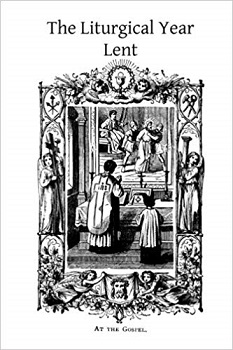
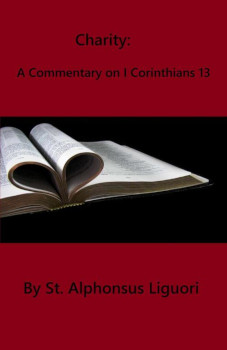










 Follow
Follow


